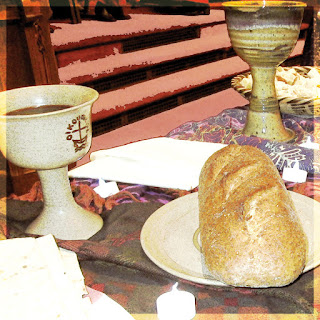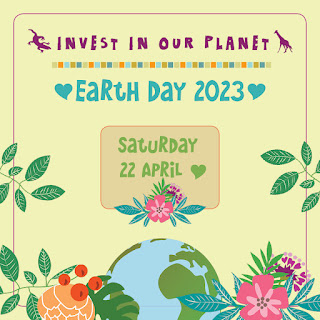Luke 24:13-35
13 Now on that same day two of them were going to a village called Emmaus, about seven miles from Jerusalem, 14 and talking with each other about all these things that had happened. 15 While they were talking and discussing, Jesus himself came near and went with them, 16 but their eyes were kept from recognizing him. 17 And he said to them, "What are you discussing with each other while you walk along?" They stood still, looking sad.
18 Then one of them, whose name was Cleopas, answered him, "Are you the only stranger in Jerusalem who does not know the things that have taken place there in these days?" 19 He asked them, "What things?" They replied, "The things about Jesus of Nazareth, who was a prophet mighty in deed and word before God and all the people, 20 and how our chief priests and leaders handed him over to be condemned to death and crucified him. 21 But we had hoped that he was the one to redeem Israel. Yes, and besides all this, it is now the third day since these things took place.
22 "Moreover, some women of our group astounded us. They were at the tomb early this morning, 23 and when they did not find his body there they came back and told us that they had indeed seen a vision of angels who said that he was alive. 24 Some of those who were with us went to the tomb and found it just as the women had said, but they did not see him."
25 Then he said to them, "Oh, how foolish you are and how slow of heart to believe all that the prophets have declared! 26 Was it not necessary that the Messiah should suffer these things and then enter into his glory?" 27 Then beginning with Moses and all the prophets, he interpreted to them the things about himself in all the scriptures.
28 As they came near the village to which they were going, he walked ahead as if he were going on. 29 But they urged him strongly, saying, "Stay with us, because it is almost evening and the day is now nearly over." So he went in to stay with them.
30 When he was at the table with them, he took bread, blessed and broke it, and gave it to them. 31 Then their eyes were opened, and they recognized him, and he vanished from their sight. 32 They said to each other, "Were not our hearts burning within us while he was talking to us on the road, while he was opening the scriptures to us?"
33 That same hour they got up and returned to Jerusalem, and they found the eleven and their companions gathered together. 34 They were saying, "The Lord has risen indeed, and he has appeared to Simon!" 35 Then they told what had happened on the road and how he had been made known to them in the breaking of the bread.
The 15th Day of Easter
Although this is Matthew's lectionary year and for Sundays during the Great Fifty Days of Easter the gospel reading usually comes from John, today it's Luke's Emmaus Road. Every year this stunning story is the appointed gospel for Easter evening, but on Easter this year I blogged about the first reading: the extravagant feast of fat things, the end of death, and the efficacy of God's Word from Isaiah 25:6-9
Emmaus Road
People have observed that Jesus in Luke's gospel always is on his way to a meal, at a meal, or leaving a meal.
On Earth Day weekend during Earth Month we hear about invitation, welcome, and food amidst ordinary activities. It's also one of countless times people didn't recognize Jesus when he first showed up. This time they didn't know it was Jesus, even though the wayfarers had just been talking about an empty tomb and suspicions that therefore, Jesus must be alive. Because the Sunday evening travelers hadn't seen Jesus themselves, were hopes they'd held for the redemption of Israel null and void?
Earth Month, Earth Day
The wellbeing and future of planet earth has reached a point of crisis in the pictogram's sense of both danger and opportunity. A half century and counting after the first Earth Day in 1970, creation is in serious peril. Species survival and the interconnected ability to feed everyone are major concerns.
Everyone needs nutrition; almost as much, everyone needs a companion to break bread with, if only along the way from where we've been to where we're headed. And sharing a meal can be a socially, culturally, humanly leveling experience. Regional dishes and national specialties are strong identity markers! What ones belong to you? To your family of origin? The country where you were born or other places you've lived? With table fellowship a keynote of his gospel, Luke counsels travelers to eat whatever their hosts provide [10:7-8]. Don't be fussy; partake of the food that's part of their hospitality—and also a slice of their culture.
What can we make of this resurrection evening account of walking, talking, wondering, meeting, and recognizing? How can we connect it with Earth Day?
What Happens After
What happened after? After the stranger who became their host broke the bread. After they knew it was Jesus because … they'd been there when he blessed, broke, and gave the bread to all those crowds on those wonderful occasions? Because they'd been in the upper room on Maundy Thursday?
When they reached Jerusalem, Cleopas and his unnamed companion told the eleven about their encounter with the risen Jesus Christ and how they recognized him because he blessed, broke, and gave them bread.
What happens to us after? After sharing a meal or a snack at our home or at someone else's? After catching a street taco or a bowl of pho to savor together? After we gather at the communion table?
The stranger they later identified as the risen Jesus Christ placed himself within the whole history of God's people, just as we do when we interpret scripture and celebrate the Lord Jesus' Supper. Our eucharistic liturgy with its narratives and actions are somewhat formal and quite ritualized, but it's the model for our being and acting after we leave the gathered assembly. After? We continue to place ourselves – in word and action – within the long history of all God's people.
Where We Live
Luke's volume 2, The Acts of Jesus' First Apostles vividly describes a newly birthed church alive with the fire and society-transforming power of the Spirit of Pentecost. We're two millennia beyond those years, and like God's people of every time and place, we get to become part of and tell the rest of the story.
As eucharistic people, we offer and return gifts of the earth to their Creator. Without a healthy planet, there's nothing to offer. Without a healthy planet, we won't have sacraments.
And the loaf can't benefit anyone until, unless, it's been broken in some way. The cup needs to be spilled, emptied to bring life. When we gather at the Communion Table we retell the history of God's people from the first creation through our hope for a fully restored new creation. Jesus hosts us at the Table of Grace where crumbs and fragments of broken bread, drops and splashes of fruit of the vine nourish and bring us together to become one body in Christ.
Regional dishes and national cuisines are strong identity markers. Cleopas and friend identified Jesus by the broken bread and poured out cup. Does Holy Communion mark our identity as God's? Will the world recognize us as the body of Christ because of broken and poured-out lives after and into another millennium?
Isaiah's Feast of Fat Things describes a finished New Creation; Luke's Emmaus Road is along the way. Let's follow this year's Earth Day hashtag, Invest in Our Planet and welcome God's promised New Creation.
Come, Lord Jesus!
The grace of the Lord Jesus be with all the saints. Amen!



No comments:
Post a Comment